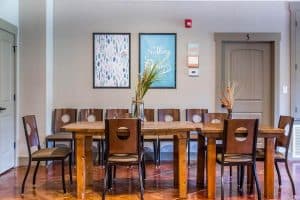Classes on cooking, meal planning add resources for early recovery
 Meriwether Shelton, RDN, LD, leads a nutrition and dietetics class at Oxford Treatment Center’s Resolutions campus.
Meriwether Shelton, RDN, LD, leads a nutrition and dietetics class at Oxford Treatment Center’s Resolutions campus.
Life-skills programs aid transition from treatment into real world
At Oxford Treatment Center’s Resolutions campus, people in early recovery from drug or alcohol addiction are learning practical skills that will ease their transition into a new sober lifestyle.
Life-skills classes at Resolutions teach valuable skills that help people move forward in life in healthy ways. The classes are offered for patients who have completed residential treatment and are continuing to receive care at the Oxford Outpatient Center.
“Teaching life skills is very important — especially among our patients who are 18 to 25 years old,” said Barbara Cox, MS, LSW, MAC, SAP, Director of Outpatient Services. “We have patients who don’t know how to use a microwave, and many who don’t know how to sort their own laundry.”
When people have been living in addiction, they’ve often had family members taking care of basic things for them. As they transition from treatment into recovery, we’re working not only to help them stay clean and sober. We want to see them move forward in life as healthy, self-sustaining individuals.

Nutrition and dietetics classes take place in the kitchens of transitional homes adjacent to the Oxford Outpatient Center. Each house has a large kitchen and dining room where patients cook and eat together.
The impact that addiction can have on someone’s life is extensive, says Meriwether Shelton, RDN, LD, who leads a nutrition and dietetics life-skills class at the Resolutions campus.
“Those battling addiction can neglect other important aspects of their lives, like eating healthy,” Shelton said.
In Shelton’s nutrition and dietetics class, patients get together every week to discuss good nutrition habits, explore recipes and plan meals. The classes take place in the kitchens of transitional homes adjacent to the Oxford Outpatient Center. Each house has a large kitchen and dining room where patients cook and eat together.
“The class teaches how to make healthy decisions,” Shelton said. “With addiction, the things going into the body are already not good, so we focus on the importance of putting good things into the body.”
Shelton says the lessons taught in the class are relevant for more than just food.
“It’s about making good choices,” she said. “Reflecting on eating habits before and after sobriety also makes people think about the new positive changes in their other habits, too.”
The class also provides opportunities for human connectivity that can be valuable in the recovery process.
 “Addiction is an isolating experience,” Shelton said. “People in addiction often do not want to reach out for help. In recovery, getting together and planning meals brings people together and builds bonds that are about helping each other. It’s another way to learn how to be part of a positive group and build trust with others.”
“Addiction is an isolating experience,” Shelton said. “People in addiction often do not want to reach out for help. In recovery, getting together and planning meals brings people together and builds bonds that are about helping each other. It’s another way to learn how to be part of a positive group and build trust with others.”
Other life skills classes offered at the Resolutions campus include those for seeking and holding jobs. This course provides guidance for patients seeking to return to the workforce. Taught by Janna Coleman, M.Ed., LPC, NCC, a former career planning specialist at the University of Mississippi, the job skills course offers instruction in resume writing and job search skills.
Learn more: Oxford Treatment Center Resolution campus